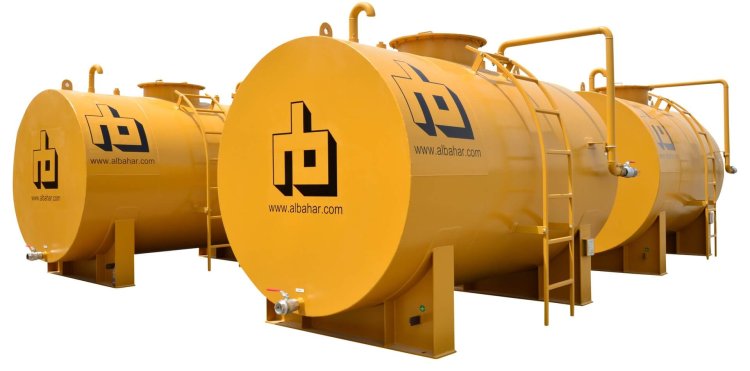Types of fuel storage tanks | Al Bahar MCEM
In this article, we will discuss the types of fuel storage tanks offered by the al-bahar Mcem
Share this Post to earn Money ( Upto ₹100 per 1000 Views )

Fuel storage tanks are essential components in various industries and settings, serving the critical purpose of storing different types of fuels, including gasoline, diesel, oil, and more. In this comprehensive guide, we'll explore the different types of fuel storage tanks commonly used, their applications, and key considerations for each.
Above-Ground Fuel Storage Tanks
Above-ground fuel storage tanks are situated on the surface, making them easily accessible for inspection, maintenance, and refueling.
Applications:
- Gasoline and diesel storage for gas stations and fleet refueling.
- On-site fuel storage for emergency generators.
- Bulk fuel storage at farms, construction sites, and industrial facilities.
Key Considerations:
- Compliance with local regulations and safety standards.
- Regular inspection and maintenance to prevent leaks and corrosion.
- Proper grounding to prevent static electricity build-up.
Underground Fuel Storage Tanks
Underground fuel storage tanks are buried beneath the ground, offering space-saving solutions and protection from external elements.
Applications:
- Gasoline and diesel storage at gas stations.
- Aviation fuel storage at airports.
- Residential heating oil storage.
Key Considerations:
- Corrosion-resistant materials to prevent tank degradation.
- Leak detection systems for early problem identification.
- Soil and groundwater monitoring for environmental protection.
Double-Walled Fuel Storage Tanks
Double-walled tanks have an inner and outer shell, creating an additional layer of protection against leaks.
Applications:
- Hazardous materials storage.
- Chemical and petrochemical industries.
- High-risk areas where fuel spillage is a significant concern.
Key Considerations:
- Regular integrity testing of both tank walls.
- Leak detection systems for immediate notification of issues.
- Compliance with environmental regulations.
Fuel Bladder Tanks
Fuel bladder tanks are flexible, collapsible containers that can be used for temporary fuel storage.
Applications:
- Military operations and remote refuelling.
- Disaster relief efforts.
- Temporary fuel storage at construction sites.
Key Considerations:
- Compatibility with the stored fuel type.
- Adequate support and protection to prevent punctures.
- Regular inspection for signs of wear and tear.
Above-Ground Storage Drums
Storage drums are small, portable containers used for short-term fuel storage.
Applications:
- Small-scale fuel storage for workshops.
- Emergency fuel supply for vehicles.
- Backup fuel storage for residential heating.
Key Considerations:
- Proper sealing to prevent evaporation and spills.
- Secure storage away from heat sources or open flames.
- Compliance with local regulations for safe handling and storage.
Vertical Fuel Storage Tanks
Vertical storage tanks are tall, cylindrical containers suitable for both above-ground and underground use.
Applications:
- Bulk fuel storage in industrial facilities.
- Agricultural fuel storage.
- Transporting fuel on trucks.
Key Considerations:
- Ventilation to prevent pressure build up.
- Adequate support and foundation for vertical tanks.
- Regular inspection for structural integrity.
Horizontal Fuel Storage Tanks
Horizontal tanks are low-profile, horizontal containers used for transporting or stationary fuel storage.
Applications:
- Bulk fuel transport on trucks.
- Stationary storage in tight spaces.
- Farm and ranch fuel storage.
Key Considerations:
- Secure anchoring during transport.
- Compatibility with vehicle specifications.
- Safety measures during filling and emptying.
Conclusion
Fuel storage tanks come in various types to meet the diverse needs of industries and applications. Choosing the right type of fuel storage tank depends on factors such as the type of fuel, storage location, regulatory requirements, and safety considerations. Regular maintenance, compliance with safety standards, and monitoring are crucial to ensure the safe and efficient storage of fuels.
Before selecting a types of fuel storage tank, it's essential to consult with experts like Al-Bahar and adhere to local regulations to ensure the proper handling and storage of fuel in your specific setting. Al-Bahar MCEM is a regional provider of high-quality custom-built modules and acoustic enclosures for a wide range of applications and packaging solutions. To learn more about Al-Bahar MCEM Product visit their website.









